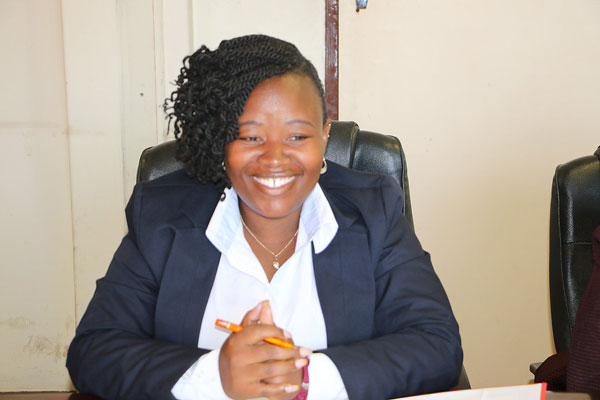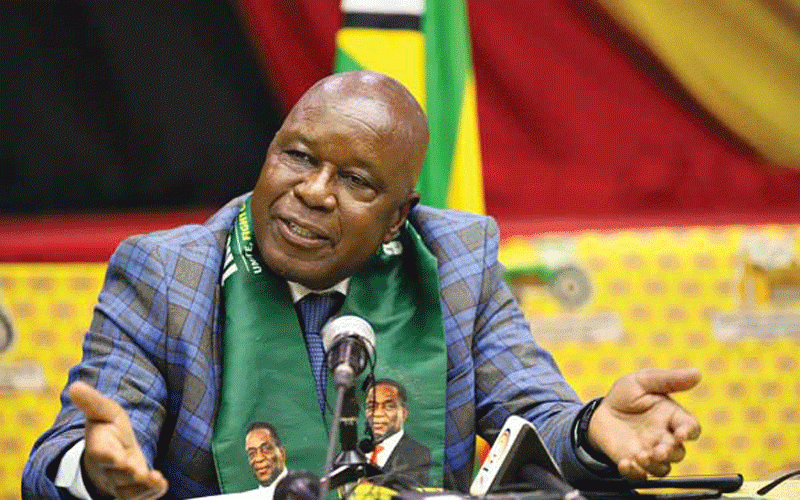

INTERVIEW: Moses Matenga
Since its formation in 1999, the MDC has been perceived by Zanu PF as a “puppet of the West” and a regime change agenda proponent with the backing of the United Kingdom and the United States.
NewsDay (ND) senior reporter Moses Matenga spoke to MDC’s secretary for international relations, Gladys Hlatshwayo (GH) on this and other issues, including engagement with Sadc and the African Union to mediate talks between President Emmerson Mnangagwa and MDC leader Nelson Chamisa. Below are excerpts of the interview.
ND: What are your expectations as the MDC from your engagement with the international community?
GH: International solidarity is key to any struggle and ours is no different. The MDC has identified international relations as one of its cardinal zones of the struggle for a democratic and developmental Zimbabwe. In line with our Roadmap to Economic Recovery, Legitimacy, Openness and Democracy (Reload) that we launched following our fifth national congress, the party seeks to build international pressure for comprehensive political and economic reforms in Zimbabwe through a credible, legitimate and bankable political dialogue platform that is guaranteed by the international community.
The international community plays a very crucial role in light of the interdependence and interconnectedness of today’s world. The dynamics in Zimbabwe have ramifications on other nation States.
This is why the political morass and economic crisis in Zimbabwe affects South Africa, for example, because millions of Zimbabweans flee from a predatory and fascist State. The international community can, therefore, put pressure on the Zimbabwean regime to reform, to uphold the Constitution, to stop corruption and patronage, to respect citizens’ rights among other measures that are required to get Zimbabwe to work again.
The MDC is, therefore, urging international players, including Sadc and the AU to intervene in order to push the current regime to see reason in resolving the impasse and institute reforms.
- Chamisa under fire over US$120K donation
- Mavhunga puts DeMbare into Chibuku quarterfinals
- Pension funds bet on Cabora Bassa oilfields
- Councils defy govt fire tender directive
Keep Reading
ND: But the government of Mnangagwa has created a perception that they are re-engaging the international community and are on the right track in instituting necessary reforms. Won’t that render your cause irrelevant?
GH: The current Harare regime had attempted to hoodwink the international community into buying its fake “new dispensation” narrative. We have successfully busted this myth as an absolute façade. The extra-judicial killings of August 1, the January 2019 crackdown on human rights defenders and members of our party, the August 2019 abductions, assaults, arbitrary arrests, banning of peaceful and constitutional marches, criminalisation of dissent, intimidation, as well as the police brutality of November 20, 2019 unequivocally indicate authoritarian consolidation rather than a regime that embraces democratic tenets. We have always insisted that this is a “new deception” not a “new dispensation” and we are glad that it has become apparent more than ever.
ND: The MDC has been perceived as a “puppet of the West”. What is the party’s foreign policy now and going forward?
GH: The MDC is a home-grown political party. We are a social democratic party anchored on the values of freedom, justice, equality and solidarity. We are a movement born out of the struggles and aspirations of the people of Zimbabwe, particularly the working people of this country. Our detractors have attempted to frame us differently, but the people we represent know and understand us better. We were established to finish the unfinished business of the liberation struggle and to positively transform the lives of citizens within the framework of a genuine democratic and developmental State.
In as far as our foreign policy is concerned, the MDC neither looks West nor East, but looks forward. We believe Zimbabwe must engage with all decent States that share its values of constitutionalism, democracy, openness, transparency and inclusivity, among others. An MDC government will pursue the following:
*Strengthen our membership within Sadc and the AU; *Strengthen, modernise and institutionalise AU and Sadc; *Pursue African integration through the establishment of a customs and monetary union; *Strengthen our membership as a responsible citizen of the United Nations, respecting the rules-based international order and work with other States to tackle global challenges; *Rejoin the Commonwealth through taking concrete measures to abide by the Harare Declaration, especially on democracy, free and fair elections and human rights; *Pursue strong relations with the European Union within the European Union/African, Caribbean and Pacific Group of States matrix; and *Ensure that Zimbabwe plays a role in conflict prevention and peacekeeping across the world.
ND: Your engagement with Sadc last week, how were the MDC issues received by those you engaged?
GH: We got an opportunity to meet the Sadc executive secretary Stergomena Lawrence Tax and her team last week and we briefed them on the crisis in Zimbabwe, including the deteriorating human rights situation, lethargy on reforms, the debilitating socio-economic crisis, including the alarming levels of corruption and State capture, as well as our proposed way forward as provided for in our policy document Reload.
The response we got was positive and there was convergence at two levels. The first level was an agreement on the fact that Zimbabwe faces a political crisis. Secondly, the executive secretary agreed that political dialogue was the only solution to the current impasse. We are glad because we were able to share our views with Tax and we shall continue to do so. We shall be intensifying our regional offensive and selling our narrative. We are also encouraged by the voices that are emerging from within Sadc, including the recent remarks by South Africa Foreign Affairs minister Naledi Pandor that there is need to deal with economic and political angles of the Zimbabwean crisis simultaneously.
ND: There is a belief that Sadc sympathises with Zanu PF when it comes to the Zimbabwean issue, how do you view that as the MDC?
GH: Zanu PF has been misleading the region, including that the challenges are as a result of “sanctions” while ignoring internal factors such as corruption and patronage. We have, therefore, set out to put the record straight and push back such Zanu PF propaganda. We are committed to keep engaging our brothers and sisters in the Sadc region in order for them to see reason in intervening in the case of Zimbabwe. The Sadc Protocol on Politics, Defence and Security article 11b allows Sadc to intervene in intra-conflicts of member States in cases of gross human rights violations and violence, as well as conflicts that threaten peace and security in the region. Sadc should utilise its early warning system to be proactive on Zimbabwe as opposed to wait for the situation to further deteriorate.
ND: Zanu PF feels dialogue among the country’s political parties should be mediated by the National Peace and Reconciliation Commission (NPRC) and other locals, a position contrary to your thoughts in the MDC that dialogue should be mediated by Sadc, is this signalling a deadlock even before the talks begin?
GH: We strongly feel that it might be difficult to get a neutral mediator in Zimbabwe given how polarised the society is. The credibility and integrity of the political dialogue hinges on the integrity of the mediator and the extent to which he/she is seen as a neutral broker. We are all aware of how our institutions in Zimbabwe are captured by the Executive and, therefore, defeating the idea of a neutral facilitator and a credible dialogue. Zanu PF’s intransigence and propensity for power retention at the expense of citizens require the involvement of the international community. In addition, the proposal for the NPRC to facilitate the political dialogue is within the framework of the Political Actors Dialogue (Polad), a framework that we have serious reservations with.
The Polad process is just meant for optics and not to genuinely deal with the hard questions of the day. This is the reason why we have called for a process that is legitimate, credible, mediated and guaranteed by the international community.
Yes, we have an impasse, which is why we are intensifying our regional offensive and international engagement to break this impasse. Zimbabweans have suffered for too long and the suffering must urgently come to an end.











